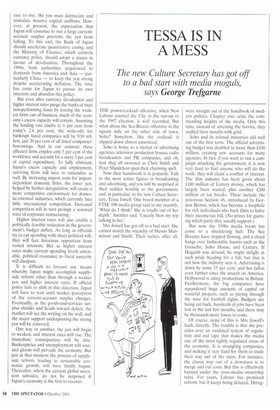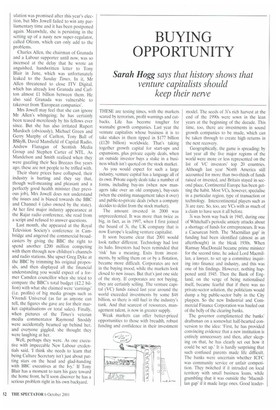TESSA IS IN A MESS
The new Culture Secretary has got off to a bad start with media moguls,
says George Trefgarne
THE prawn-cocktail offensive, when New Labour courted the City in the run-up to the 1997 election, is well recorded. But what about the Sea-Breeze offensive in the square mile on the other side of town, Soho? Somehow, like the cocktail, it slipped down almost unnoticed.
Soho is home to a myriad of advertising agencies, television production houses, radio broadcasters and PR companies, and oh, how they all swooned as Chris Smith and Peter Mandelson spun their charming spell.
Now their handiwork is in jeopardy. Talk to the most senior figures in broadcasting and advertising, and you will be surprised at their sudden hostility to the government, and, in particular, to the new Culture Secretary, Tessa Jowell. One board member of a FTSE 100 media group said to me recently, 'What do I think? She is totally out of her depth.' Another said, 1 nearly blew my top talking to her.'
Mrs Jowell has got off to a bad start. She cannot match the wizardry of Messrs Mandelson and Smith. Their tactics, after all, were straight out of the handbook of modern politics. Chapter one: seize the commanding heights of the media. Only this time, instead of arresting the luwies, they stuffed their mouths with gold.
Soho and its related industries did well out of the first term. The official advertising budget was doubled to more than 100 million, creating new accounts for many agencies. In fact, if you want to run a campaign attacking the government, it is now very hard to find anyone who will do the work: they will claim a conflict of interest. The film industry has been given about £100 million of Lottery money, which has largely been wasted, plus another £200 million of tax breaks. These include the notorious Section 48, introduced by Gordon Brown, which has become a loophole for rich individuals who back films to halve their income-tax bill. (No prizes for guessing which party they usually support.) But now the 1990s media boom has come to a shuddering halt. The Sea Breezes have stopped flowing, and a cloud hangs over fashionable haunts such as the Groucho, Soho House, and Century. If Hogarth was around, he might delight at such pride heading for a fall, but that is not how the industry sees it. Advertising is down by some 15 per cent, and has fallen even further since the assault on America. Hollywood is axing productions in Britain. Furthermore, the big companies have squandered huge amounts of capital on wasteful projects, such as paying through the nose for football rights. Budgets are being cut back, hundreds of jobs have been lost in the last few months, and there may be thousands more losses to come.
Of course, none of this is Mrs Jowell's fault, directly. The trouble is that she presides over an outdated system of regulation and red tape that makes the media one of the most tightly regulated areas of the economy. It is strangling companies, and making it very hard for them to trade their way out of the mess. For instance, the classic way out of a downturn is to merge and cut costs. But this is effectively banned under the cross-media ownership rules. For years, Labour has promised reform, but it keeps being delayed. Dereg
ulation was promised after this year's election, but Mrs Jowell failed to win any parliamentary time and it has been postponed again. Meanwhile, she is persisting in the setting up of a nasty new super-regulator, called Ofcom, which can only add to the problems.
Charles Allen, the chairman of Granada and a Labour supporter until now, was so incensed at the delay that he wrote an anguished, handwritten letter to Tony Blair in June, which was unfortunately leaked to the Sunday Times. In it, Mr Allen threatened to close ITV Digital, which has already lost Granada and Carlton almost £1 billion between them. He also said Granada was vulnerable to takeover from 'European companies'.
Mrs Jewell may feel that she can ignore Mr Allen's whingeing; he has certainly been teased mercilessly by his fellows ever since. But she has also irritated Rupert Murdoch (obviously), Michael Green and Gerry Murphy of Carlton, Tony Ball of BSkyB, David Mansfield of Capital Radio, Andrew Flanagan of Scottish Media Group and Stephen Carter of NTL. As Mandelson and Smith realised when they were guzzling their Sea Breezes five years ago, these are not people to be trifled with.
Their share prices have collapsed, their industry is hurting and they say that, though well-meaning and pleasant and a perfectly good health minister (her previous job), Mrs Jowell does not understand the issues and is biased towards the BBC and Channel 4 (also owned by the state). At her first major industry appearance at the Rajar radio conference, she read from a script and refused to answer questions.
Last month, she appeared at the Royal Television Society's conference in Cambridge and angered the commercial broadcasters by giving the BBC the right to spend another £200 million competing with them through new children's channels and radio stations. She upset Greg Dyke at the BBC by trimming his original proposals, and then displayed all the financial understanding you would expect of a former Camden councillor when she tried to compare the BBC's total budget (£2.2 billion) with what she claimed were 'earnings' (i.e. profits) of big media groups such as Vivendi Universal (as far as anyone can tell, the figures she gave are for their market capitalisations or total sales). Finally, when pictures of the Times's veteran media commentator Raymond Snoddy were accidentally beamed up behind her, and everyone giggled, she thought they were laughing at her.
Well, perhaps they were. As one executive with impeccable New Labour credentials said, 'I think she needs to learn that being Culture Secretary isn't just about patting stars on the head and glad-handing with BBC executives at the Ivy.' If Tony Blair has a moment to turn his gaze toward the home front, he'll soon discover he has a serious problem right in his own backyard.



































































































 Previous page
Previous page